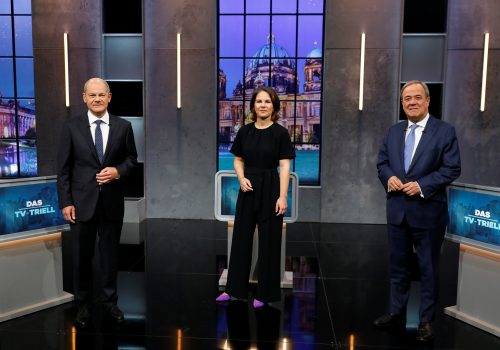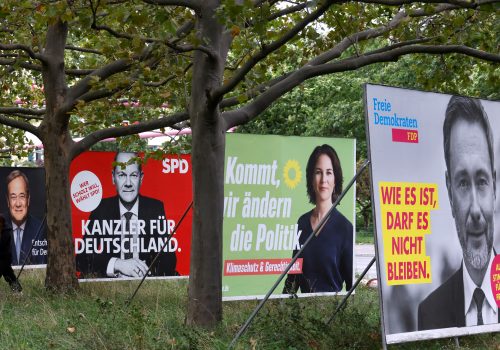FAST THINKING: Germany finally gets a (colorful) new government
JUST IN
The traffic light is a go. Nearly two months after they handed a narrow victory to the Social Democratic Party (SPD)‚ German voters finally have their next chancellor. SPD chief Olaf Scholz will lead the country’s first government without Angela Merkel at the helm in sixteen years after his party struck a deal with the Greens and the Free Democratic Party (FDP). So what exactly will change and what will stay the same in the post-Merkel era? Our experts drive into the details of what to expect from the “traffic light coalition.”
TODAY’S EXPERT REACTION COURTESY OF
- Jörn Fleck: Deputy director of the Europe Center
- Sophia Besch (@SophiaBesch): Nonresident senior fellow at the Europe Center
Slide (ever so slightly) to the left
- Don’t expect a “great leap forward for German policy posture,” Jörn tells us: “On balance and perhaps in true German fashion, the three-way coalition among Social Democrats, Greens, and Liberals promises more continuity than change.”
- Sure, two of the three parties in government are more left-leaning relative to Merkel’s long-ruling Christian Democrats. But they haven’t managed to move the needle in that direction yet. “The pro-business, libertarian FDP, as the odd man out in the new left-of-center-dominated coalition, appears to have won important concessions and blocked some of its more progressive partners’ most ambitious projects,” Jörn says.
- Consider the clean-energy transition. The coalition agreement, Jörn notes, contains “no aggressive carbon pricing, no end to symbolic subsidies for fossil fuels, and a nein to speed limits on the German Autobahn.”
- Still, there are some signs of movement: Jörn points to “promising” plans on affordable housing, pension reform, and migration policy.
Military matters
- At a time when Germany’s NATO “nuclear sharing” agreement, in which Germany maintains a capability to deliver US nuclear weapons, has been questioned by the Greens among others, the deal sends conflicting signals, Sophia says. But overall it “should be cause for some relief among Germany’s allies.”
- Germany will now join the Treaty on the Prohibition of Nuclear Weapons as an observer, but “the parties appear to want to find a nuclear-capable replacement for the aging Tornado” fighter-jet fleet, Sophia points out. Meanwhile the new governing coalition wants to join in NATO nuclear strategy and “contribute to credible deterrence” against Russia, Sophia adds: “So while there are some internal contradictions here, a major nuclear-policy shift seems not in the cards.”
- Under pressure to fulfill its commitment to spend 2 percent of its gross domestic product on the military, Germany has been steadily increasing its defense budget. Germany’s new coalition doesn’t specifically promise to achieve that goal, though it does commit 3 percent of German GDP to defense, diplomacy, and development. The German military “over the last decade has gone back and forth in its orientation towards territorial defense or crisis management,” Sophia says. “The new government wants the armed forces to be able to deliver both.”
- Jörn notes how the agreement’s approach to China and Russia is likely to disappoint hawks in its “relative balance,” urging “dialogue and engagement with Moscow and Beijing on the one hand and calling out both for human-rights abuses, meddling, and aggression on the other.”
- Also keep in mind what’s missing, Jörn adds: “Gone [is] the Greens and Liberals’ idea of a national security council” that could have helped Germany develop a more “coherent strategic culture,” he tells us. “But a new national security strategy is a step forward.”
What Europe sees
- The Franco-German relationship at the heart of European Union policy should come away bolstered, Jörn argues. “French President Emmanuel Macron’s team will note references throughout the agreement to a more sovereign and more capable European Union,” he says, while Paris should get along well with an SPD chancellor and foreign office led by the Greens.
- A more vocal approach to EU rule-of-law challenges will be less welcome in Poland and Hungary, which have tested the bounds of EU legal sovereignty. The coalition agreement is clear in its support for stricter enforcement of EU policies around rule of law. “Warsaw and Budapest might not yet be all too worried amid complex EU decision-making processes and dynamics in this area,” Jörn predicts. “But they should prepare for a change in tone and tack from Berlin.”
- Yet while the disciplined negotiations that brought Germany to this point could signal the new government’s governing prowess, he predicts that “day-to-day politics and crisis management” will likely cause fissures in the coalition and put all the focus in the months ahead on keeping this novel three-way coalition together.
Further reading
Mon, Sep 27, 2021
FAST THINKING: Germany’s ‘messy’ post-Merkel moment
Fast Thinking By
What could Germany’s next government look like? And what will it mean for Europe and the wider world? Our experts capture the zeitgeist.
Fri, Sep 24, 2021
Coalition crazy: Here’s how Germany’s new government could shake out
New Atlanticist By Jörn Fleck
Germany's federal elections could send Europe’s largest economy into messy, months-long coalition negotiations.
Fri, Sep 3, 2021
Germany’s defense minister: Only political will can protect Europe
New Atlanticist By
The debate over EU security and defense should be about political will—not institutions.
Image: Annalena Baerbock, federal leader of Bündnis 90/Die Grünen, Robert Habeck, federal leader of Bündnis 90/Die Grünen, Olaf Scholz, SPD candidate for chancellor and acting federal finance minister, and Christian Lindner, party leader of the FDP, come to a press conference to present the joint coalition agreement of the traffic light parties of SPD, Bündnis 90/Die Grünen and FDP for the future federal government. Photo by Michael Kappeler/DPA via Reuters.


